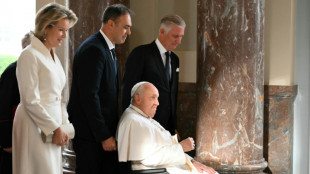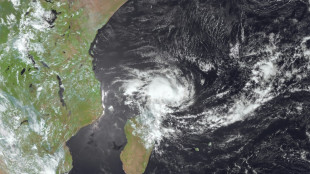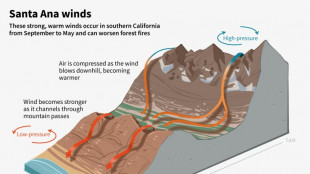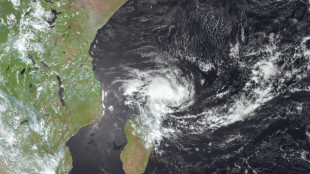
-
 Oil giant BP cuts thousands of jobs to slash costs
Oil giant BP cuts thousands of jobs to slash costs
-
Punishing Paolini sprints into third round at Australian Open

-
 Cyprus hails new access to US defence goods
Cyprus hails new access to US defence goods
-
Racing's Farrell back from injury for Champions Cup match against Stormers

-
 Schareina wins penultimate bike stage but Sanders on course for Dakar victory
Schareina wins penultimate bike stage but Sanders on course for Dakar victory
-
Pope Francis bruises arm in fall at Vatican

-
 Arsenal optimistic in Premier League title race: Raya
Arsenal optimistic in Premier League title race: Raya
-
EU announces 120 mn euros in Gaza aid after ceasefire

-
 Patients dying in corridors as UK hospital standards 'collapse': report
Patients dying in corridors as UK hospital standards 'collapse': report
-
Sinner roars back in Melbourne as Swiatek sets up Raducanu clash

-
 'Nervous' teen star Fonseca out of Australian Open after thriller
'Nervous' teen star Fonseca out of Australian Open after thriller
-
Nepal's top court bars infrastructure in protected areas

-
 Stock markets jump as inflation worries ease
Stock markets jump as inflation worries ease
-
Sinner drops rare set en route to Australian Open third round

-
 China to probe US chips over dumping, subsidies
China to probe US chips over dumping, subsidies
-
Israel accuses Hamas of backtracking on fragile ceasefire deal

-
 Chinese apps including TikTok hit by privacy complaints in Europe
Chinese apps including TikTok hit by privacy complaints in Europe
-
Blasts in Kyiv as UK's Starmer visits to ink '100-year' accord

-
 Hong Kong mogul Jimmy Lai grilled over US, Taiwan ties
Hong Kong mogul Jimmy Lai grilled over US, Taiwan ties
-
Pakistan, West Indies seek to improve from Test Championship lows

-
 Trauma and tragedy in the City of Angels: covering the LA fires
Trauma and tragedy in the City of Angels: covering the LA fires
-
Spain raises flag at Damascus embassy after 12-year closure

-
 Teen star Fonseca out of Australian Open in five-set thriller
Teen star Fonseca out of Australian Open in five-set thriller
-
Travel agencies say North Korea reopens border city to tourism

-
 India's outcast toilet cleaners keeping Hindu festival going
India's outcast toilet cleaners keeping Hindu festival going
-
Apple loses top spot in China smartphone sales to local rivals

-
 Sri Lanka signs landmark $3.7 bn deal with Chinese state oil giant
Sri Lanka signs landmark $3.7 bn deal with Chinese state oil giant
-
'I had 10 minutes': Lys makes most of Australian Open second chance

-
 Spanish FM raises flag at Damascus embassy after 12-year closure
Spanish FM raises flag at Damascus embassy after 12-year closure
-
Blue Origin's New Glenn rocket blasts into orbit for first time

-
 UK economy rebounds but headwinds remain for govt
UK economy rebounds but headwinds remain for govt
-
Rice fields turned into art in northern Thailand

-
 Stocks follow Wall St higher on welcome US inflation data
Stocks follow Wall St higher on welcome US inflation data
-
South Korea's president arrest: what happens next?

-
 Blue Origin's New Glenn rocket blasts off in first launch, reaches orbit
Blue Origin's New Glenn rocket blasts off in first launch, reaches orbit
-
Chinese give guarded welcome to spending subsidies

-
 World Bank plans $20 bn payout for Pakistan over coming decade
World Bank plans $20 bn payout for Pakistan over coming decade
-
Indian Bollywood star Saif Ali Khan stabbed in burglary

-
 Taiwan's TSMC says net profit rose 57% in fourth quarter
Taiwan's TSMC says net profit rose 57% in fourth quarter
-
India achieves 'historic' space docking mission

-
 South Korea's Yoon avoids fresh questioning after dramatic arrest
South Korea's Yoon avoids fresh questioning after dramatic arrest
-
Olympic push for kho kho, India's ancient tag sport

-
 Dangerous Fritz sets up Monfils clash at Australian Open
Dangerous Fritz sets up Monfils clash at Australian Open
-
AFP photographer's search for his mother in the Nazi camps

-
 Life after the unthinkable: Shoah survivors who began again in Israel
Life after the unthinkable: Shoah survivors who began again in Israel
-
Israeli cabinet to vote on Gaza ceasefire deal

-
 Jabeur finds it 'hard to breathe' as asthma flares up in Melbourne
Jabeur finds it 'hard to breathe' as asthma flares up in Melbourne
-
Swiatek powers on as Sinner, Medevedev top men's Melbourne bill

-
 Nintendo rumour mill in overdrive over new Switch
Nintendo rumour mill in overdrive over new Switch
-
Biden warns of Trump 'oligarchy' in dark farewell speech


Top climate fundraiser offers defense of disruptive protests
For years, Margaret Klein Salamon labored behind the scenes to try to convince politicians about the existential threat posed by climate change.
Today, she has changed her approach: the American activist is in charge of a fund that exclusively finances groups engaging in civil disobedience.
It's the "most effective way to change policy fast, and public opinion," the 37-year-old New Yorker told AFP during an interview in her Brooklyn neighborhood.
Salamon is the executive director of the Climate Emergency Fund, which was founded in 2019 by the filmmaker Rory Kennedy -- niece of the late president -- and Getty family heiress Aileen Getty.
Its board of directors includes Adam McKay, director of the satirical film about climate, "Don't Look Up," who is also the biggest donor.
In 2022, the fund distributed $5 million to groups such as Just Stop Oil, Extinction Rebellion, Scientist Rebellion, and more.
These are the groups behind some of the most eye-catching recent climate protests: gluing their hands to roads or airport runways, disrupting sports events or throwing soup or paint at works of art protected by glass.
Such actions have drawn anger and accusations of harming the wider cause.
But Salamon, author of "Facing the Climate Emergency," stands by the headline-grabbing protests.
"Social science and history both are very clear, that disruptive activism is the fastest way to create transformative change," says the Harvard graduate.
"Which tactics of the civil rights movement or the suffragettes or the AIDS movement went too far?" she argues, provocatively.
For her, the arguments against just don't hold water. "I would like to actually hear from someone who says, 'I used to care about climate change, but now that these protesters have used these tactics, I no longer do.'"
- 'Emergency mode' -
The goal, she says, is to make the issue as visible as possible, so that it is present in the minds of voters. And to broaden a sense of "climate emergency," that she believes is "contagious."
"Humans evaluate risk socially, not rationally," explains the trained psychologist, who made a complete career shift shortly after witnessing the devastation caused by Hurricane Sandy in New York City in 2012.
For example if a fire alarm goes off in an office, people take their cues from others and generally stay calm and assume it's a drill, unless told emphatically otherwise, particularly by someone in leadership.
Such mass awareness can happen "pretty quickly," she argues, and trigger a shift into "emergency mode."
That's what it'll take for a massive mobilization of resources she believes, like what happened during the Second World War or during the Covid pandemic.
Activists want to break the "mass delusion of normalcy" among those members of the public that remain passive and disengaged.
They're also targeting the decision-makers themselves, with very concrete results, she argues.
Joe Manchin, a US senator whose vote was key to passing Joe Biden's signature climate law, was followed by protesters for months, blocking his car, his boat, and more. The fund spent around $200,000 to support them.
Salamon is under no illusion that the protests alone were enough to sway the West Virginia lawmaker. But even if they were "two percent of the reason," for passage of the Inflation Reduction Act, which comes with $370 billion in climate investments, "just think about that return on investment."
- 'Not a popularity contest' -
While there has been a large influx of money into the climate space, not enough has been directed towards activism, warns Salamon.
What she calls the "reformist gradualist movement," that works "within the system" and is embodied by groups like Greenpeace, has been the dominant force for decades.
But for new groups, she quickly became aware of the significance of fundraising -- "a very unpopular" role, in her words, but one in which she found herself to be highly effective.
Ironically, she's not personally drawn to protests. Having never been arrested, she says she has nothing but admiration for the "incredibly brave" demonstrators on the ground, some of whom have gone to prison.
She condemns growing repression by governments towards climate dissidents, stressing that the groups supported by the Climate Emergency Fund are committed to being nonviolent.
But she's not worried if public sentiment isn't always in favor. "It's not a popularity contest," she says.
"We're sleepwalking off of a cliff -- and the activists are shaking us, trying to wake us up," she says. No one likes being shaken, but inaction will lead to a far worse outcome.
L.Harper--AMWN



